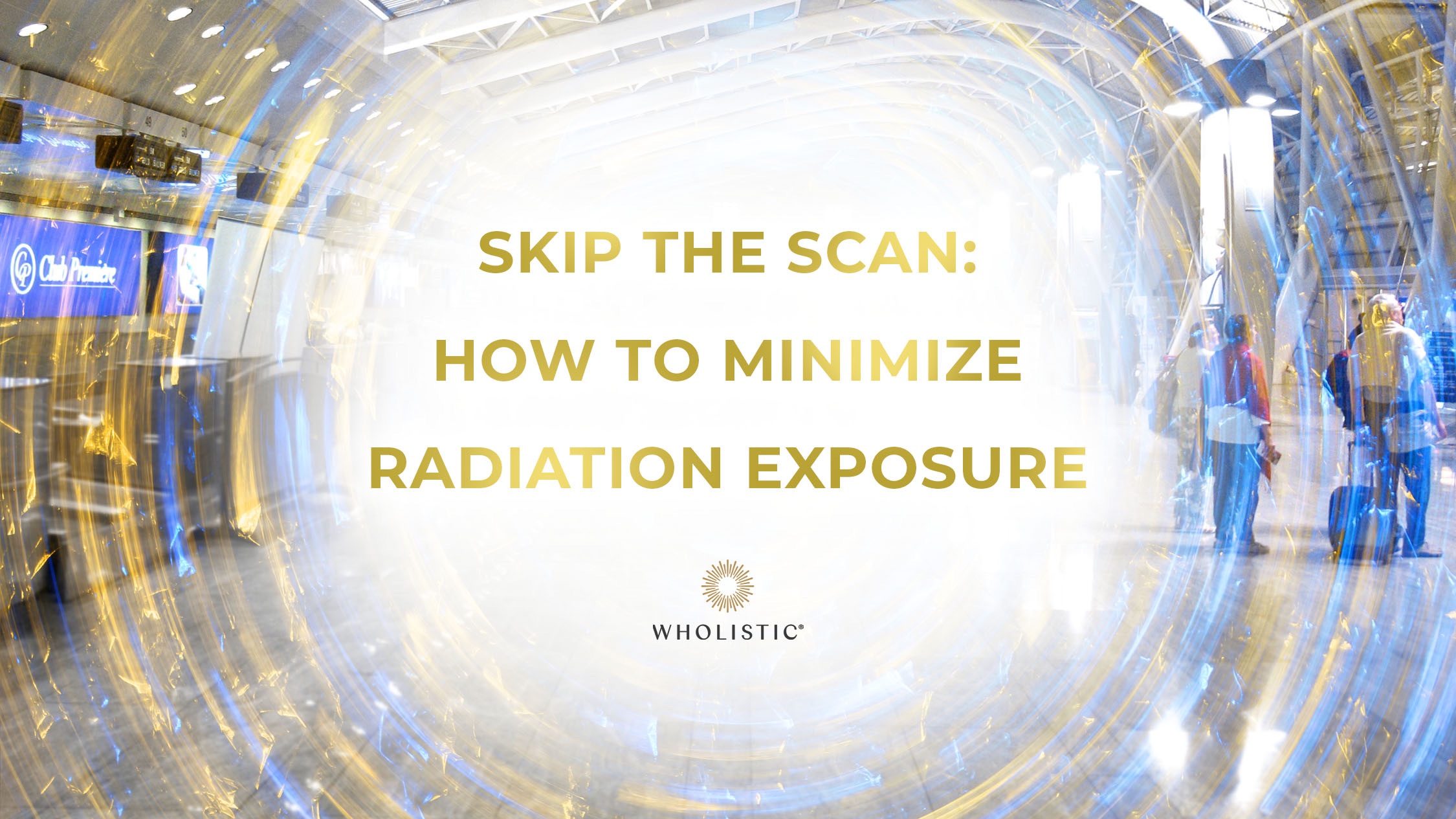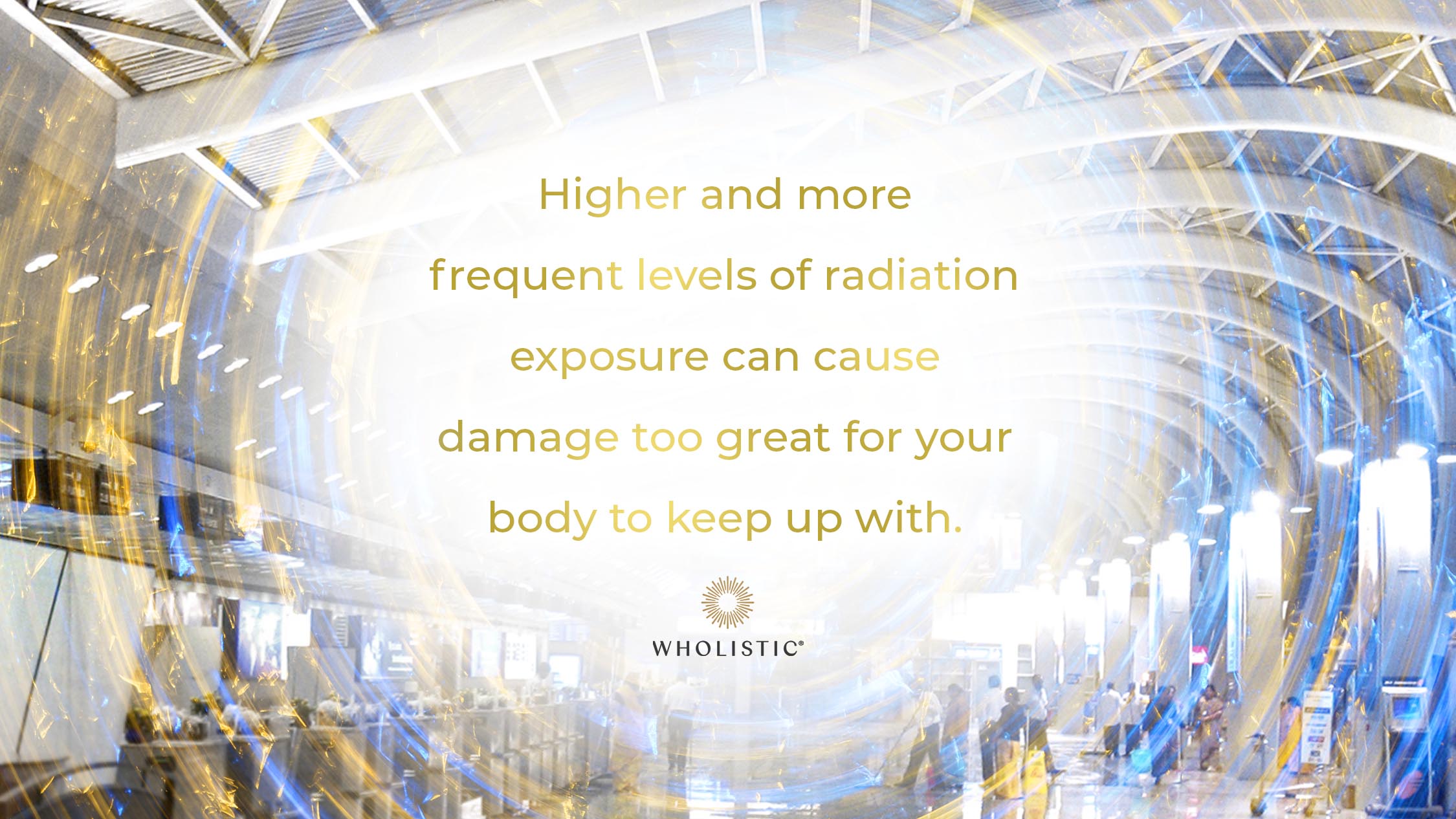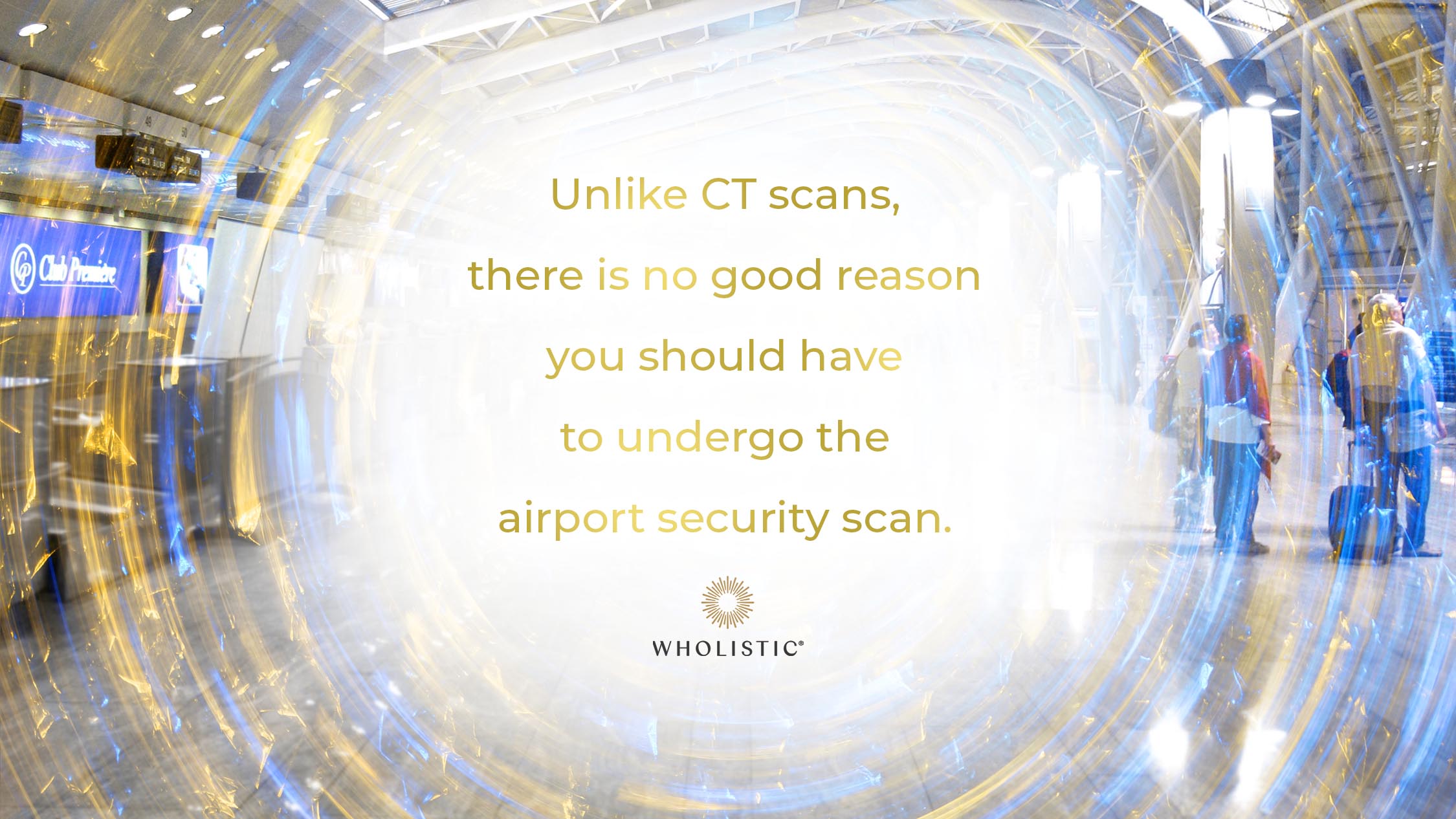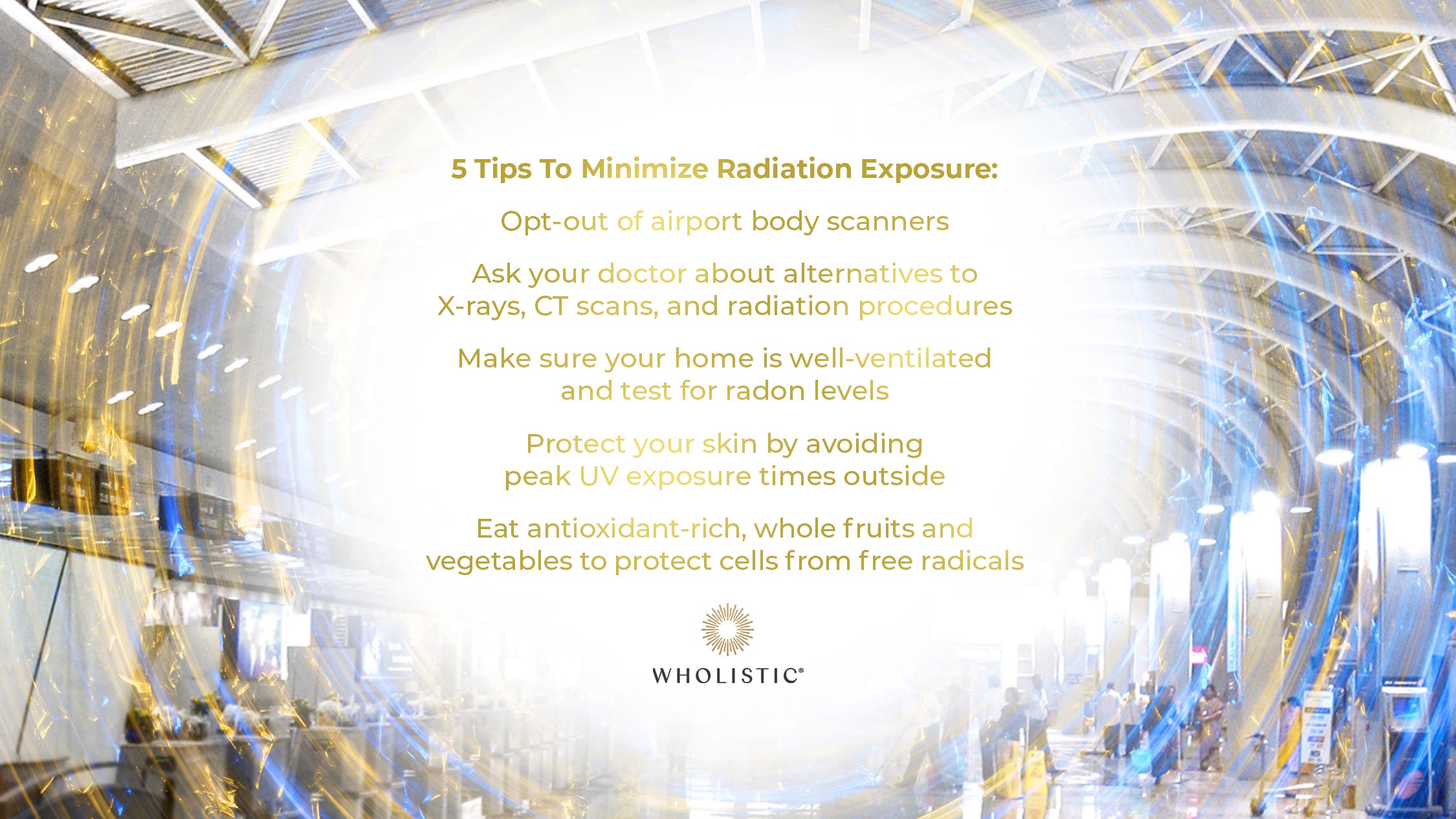Skip The Scan: How To Minimize Radiation Exposure

Do you have any summer trips planned?
Travelers eager to trot the globe are taking advantage of reduced travel restrictions. Airport use is increasing as more people book international trips and domestic travel visits with friends and family.
I wanted to take this opportunity to address a health hazard at the airport that is entirely avoidable if you know your options…
Receiving the security scan at the airport exposes you to low doses of ionized radiation.
In this blog, I’m sharing everything you need to know about what ionizing radiation is, why you should be wary of excess radiation exposure, how to skip the scan at the airport, 5 tips to minimize your radiation exposure, and how you can begin healing if you’ve suffered damage from ionized radiation exposure.
What Is Ionizing Radiation?
Ionizing radiation is a type of energy that is so powerful it strips electrons from the outer shells of atoms and molecules, resulting in the formation of ions. This radiation can come from natural or human-made sources and is harmful to living organisms. (1) Understanding where you might encounter radiation in your daily life is important so you can take action to protect yourself when possible.
Here are some common sources of radiation:
- Airport security scanners (2)
- Cosmic radiation from outer space
- Solar radiation from sun exposure
- Medical procedures such as X-rays, CT scans, or PET scans
- Radiation therapy for cancer treatment
- Radon gas, a natural radioactive gas from the ground that can accumulate in buildings
- Nuclear power plants, nuclear waste storage facilities, and nuclear weapons testing
Low levels of radiation exposure, such as those from airport scanners, are generally considered safe. However, repeated exposure can damage your body on a cellular level and increase the risk of many serious health concerns. If you are a frequent flyer, you will want to proceed to security checkpoints with caution!
How Does Ionizing Radiation Affect Cells?
Ionizing radiation can damage cells by breaking apart molecules and producing free radicals. When ionizing radiation enters the body – it can interact, alter, or damage the DNA in your cells. Harmful radiation can damage the proteins and membranes of your cells, which disrupts their normal function.
Cells that divide quickly, like fetal tissue or cancerous tumors, are more vulnerable to radiation. Damaged cells may lose the ability to reproduce and new cells might mutate, increasing your risk of developing cancer. (3)
It's important to understand that the damaging effects of radiation can build up over time with repeated exposure.
The effects of ionizing radiation on your cells depend on a number of factors, including the amount and duration of exposure. At low levels of exposure, your body can usually repair any damage caused by the radiation. However, higher and more frequent levels of exposure can cause damage too great for your body to keep up with.

Health Implications Of Radiation Exposure
If your cells are exposed to high levels of radiation, it can cause immediate damage. You may experience radiation sickness which can lead to symptoms like:
- Burns
- Rashes
- Skin Ulcers
- Nausea
- Vomiting
- Diarrhea
- Fatigue
Even lower levels of exposure can have long-term effects on your health including:
- Leukemia
- Cataracts
- Thyroid problems
- Fertility problems
- Heart disease
- Cancer
One of the most well-studied effects of ionizing radiation is an increased risk of cancer. Studies indicate that the surplus radiation from CT scans can cause mutations in DNA, leading to an alarming increase in the occurrence of new cancer cases. It's estimated that as many as 29,000 new cancer cases in the US alone in 2007 could have been linked to CT scans, and the numbers are still increasing. (4,5,6)
If your doctor says you need a CT scan, there are 3 questions you should ask:
- Why is the CT scan being done?
- How the results will affect your treatment?
- What will happen if you skip it?
There are times when the benefit of the scan outweighs the risk and you will need to have it done, but it’s important to know your rights and advocate for yourself so you are fully informed.
So, what can you do to protect yourself from ionizing radiation from airport security scans?
How To Skip The Scan
 Unlike CT scans, there is no good reason you should have to undergo the airport security scan. It is all too easy to just go along with what everyone else is doing or with what seems most convenient - but know that you have options!
Unlike CT scans, there is no good reason you should have to undergo the airport security scan. It is all too easy to just go along with what everyone else is doing or with what seems most convenient - but know that you have options!
To skip the scan during a security check at the airport, simply let a TSA agent know you would like to opt out of the scan and receive a pat-down instead. You may have to wait for an available TSA agent to receive the pat-down (know that you have the option to go to a private room if you prefer!) so plan ahead and allow yourself extra time to get through security so you don’t miss your flight!
Here is the exact verbiage from the TSA website about requesting a pat-down to opt out of the scan:
“At any time during the screening process, you may request private screening and have a witness of your choice present. The screening is conducted by a TSA officer of the same gender. The officer will explain the pat-down process before and during the screening. Since pat-down screening is conducted to determine whether prohibited items are concealed under clothing, sufficient pressure must be applied in order to ensure detection. You should inform the officer if you have a medical condition or any areas that are painful when touched.”
By cultivating awareness of potential health hazards and taking necessary precautions, you can ensure you are doing everything in your power to protect your body.
5 Tips To Minimize Radiation Exposure
While it's not always possible to completely avoid radiation exposure, there are steps you can take to minimize your exposure and protect yourself from unnecessary harm.

Here Are 5 Tips To Minimize Radiation Exposure:
- Opt-out of airport body scanners and choose a pat-down search instead
- Ask your doctor about alternatives to X-rays, CT scans, and other radiation procedures
- Make sure your home is well-ventilated and test for radon levels
- Protect your skin by avoiding peak UV exposure times when you’re spending a lot of time outside
- Eat antioxidant-rich, whole foods like fruits and vegetables to help protect cells against damage from cancer-causing free radicals
Are you concerned about your past exposure to ionized radiation? Check out my personalized Wholistic Quantum Testing!
Wholistic Quantum Testing
With Wholistic Quantum Testing, you can gain a deeper understanding of your body's needs. This revolutionary remote testing method uses advanced, non-invasive techniques rooted in applied kinesiology and quantum physics to provide you with personalized insights into your health, no matter where you are in the world.
The results of the testing will reveal the root cause of your health imbalances and guide my personalized diet, supplement, and wellness recommendations so they are a perfect vibrational match for your unique needs.
Click the link below to learn more about this service as well as the 3 and 6-month package options!
Learn More
References
1. National Cancer Institute. "Ionizing Radiation." NCI Dictionary of Cancer Terms. Accessed May 2, 2023. https://www.cancer.gov/publications/dictionaries/cancer-terms/def/ionizing-radiation.
2. Begley, Sharon. "Airport Full-Body Scanners: What's Your Exposure?" Harvard Health Publishing, 7 June 2011.
3. New Jersey Department of Environmental Protection. "Radiation Facts: How Much Radiation Is Too Much?" Revised October 2007. https://www.nj.gov/dep/rpp/llrw/download/fact07.pdf.
4. Public Citizen. "The Dark Side of CT Scans." 16 September 2008.
5. Berrington de Gonzalez, Amy, Mahadevappa Mahesh, Kimiyo Yasui, Ruth Kleinerman, and Charles E. Mettler Jr. “Projected Cancer Risks From Computed Tomographic Scans Performed in the United States in 2007.” JNCI Journal of the National Cancer Institute, vol. 103, no. 1, 2010, pp. 17–26. doi:10.1093/jnci/djp463.
6. Brenner, David J., Eric J. Hall, and Walter E. Huda. “Computed Tomography — An Increasing Source of Radiation Exposure.” The New England Journal of Medicine, vol. 357, 2007, pp. 2277–2284. doi:10.1056/NEJMra072149.
Discover Three Powerful Ways to Bring Health & Vitality Into Your Everyday Life in This FREE Masterclass by Worldwide Master Practitioner In Wholistic Healing, Elena Bensonoff.
Sign Up for the Masterclass below:






